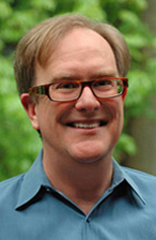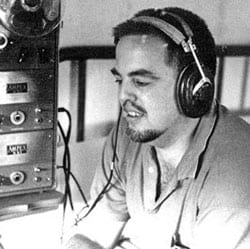
Tim W. Brown is not an author to limit himself to a single genre. In Second Acts – Brown’s latest novel following Deconstruction Acres (1997), Left of the Loop (2001), and Walking Man (2008) – the long-time Chicagoan and current New Yorker effortlessly blends sci-fi and western elements into the comic historical tale of Dan Connor, a 21st-century slacker who time travels to 1830s America in search of his adulterous wife. Winner of the 2010 London Book Festival Award for General Fiction, Second Acts is a sly, satirical page-turner in the vein of Mark Twain that is guaranteed to leave readers laughing and thinking. On Thursday, May 5th, you can hear Mr. Brown read from Second Acts when he visits EPL’s 1st Floor Community Meeting Room at 7 p.m. along with local author Paul McComas. In anticipation of his visit, we recently spoke with him via email about his extensive research for Second Acts, Potawatomi berdaches, second chances in American life, and what he’s working on next.
Evanston Public Library: Second Acts has been favorably compared to the work of Mark Twain, Jules Verne, and Jack Finney thanks to its unique mix of humor, history, and the sci-fi and western genres. Where did the idea for the novel originate? How much of the book was pre-planned, and how did it evolve over time? Did you always intend for it to be funny? How did the experience of writing Second Acts compare to your work on your three previous novels?
Tim W. Brown: Thanks, Russell, for your and the library’s interest in my novel. I’ve been fortunate to receive such comparisons. Honestly, I didn’t think much about these authors, try to emulate them, or model my work after theirs when I wrote the book. It’s always difficult to track where the ideas for a novel come from – there are so many intellectual and imaginative strands that gather together over time. I can say that the period from 1820 to 1850 is a kind of blank spot in the popular understanding of U.S. history. It’s after the Revolutionary and Constitutional eras and before the dramatic events leading up to the Civil War. That it’s relatively unknown made it attractive to me as a subject – it was unmined territory. As I researched the book, I found it to be a fascinating era of moral reform and social experimentation, not unlike the 1960s.
All four of my novels are comic in tone. It’s very purposeful. As my first true historical novel, Second Acts examines American culture and history in a humorous light, which is necessary to come to terms with the nation’s often checkered past. Mockery and satire are tremendous weapons against the sanctimonious insanity of American life and politics. This is true for 1835 as well as for 2011.
 EPL: How much research was required to bring to life 1830s-era Chicago, Buffalo, and New York City? What role did your local library play in your research process? How did you choose real life characters such as Sylvester Graham, Lydia Maria Child, and Albert Gallatin to include in Second Acts, and how difficult was it to weave them into the narrative?
EPL: How much research was required to bring to life 1830s-era Chicago, Buffalo, and New York City? What role did your local library play in your research process? How did you choose real life characters such as Sylvester Graham, Lydia Maria Child, and Albert Gallatin to include in Second Acts, and how difficult was it to weave them into the narrative?
TWB: Before I even started writing the book, I did about sixteen months of research on the antebellum period. I read contemporary sources like Alexis de Tocqueville and Frances Trollope, whose Domestic Manners of the Americans is an essential (and witty) take on the era. I read more recent books like Arthur Schlesinger Jr.’s The Age of Jackson and The Murder of Helen Jewett, which recounts the notorious case of a prostitute’s murder in 1836.
I certainly did make use of libraries, both public and private, in my research. In addition to viewing exhibits at the Chicago Historical Society, New York Historical Society, and the Museum of the City of New York, I spent time in their libraries browsing through primary sources such as pamphlets, manuscripts and maps. The New York Public Library has a tremendous online image library that allowed me to view prints and drawings of people and places in New York City and beyond. I even visited a place in Massachusetts, Old Sturbridge Village, which preserves an 1830s-era town (like Colonial Williamsburg), and I saw an off-Broadway production of Metamora, probably the most popular play of the 1830s, which is featured in Second Acts.
Each and every book I read or place I visited or image I viewed created and reinforced weird connections among my chosen set of characters. The most interesting example is Albert Gallatin, who was a true polymath: a brilliant diplomat, financier, writer, college founder, and collector of Native American languages. In many ways, he’s the glue that holds the story together. His many interests and careers are an example for Dan Connor, the protagonist, during his rise in New York society.
EPL: Listening Rabbit (aka Bunny) is a wildly entertaining, unforgettable character who’s been compared to Jim in Huckleberry Finn. Can you tell us about your inspiration in creating this unique character? Is she in any way modeled after an actual historical figure? Why did you select her to accompany Dan on his quest?
TWB: Well, again, who knows how these things enter one’s head? I needed a sidekick for Dan, and it made sense for him/her to be a Native American, given how he needs a guide when he lands in frontier Illinois after traveling back in time. As I read about the dominant Chicago-area tribe of the time, the Potawatomi, I learned about berdaches, essentially transgender individuals who were male but lived the lives of females. They were highly respected among their tribes and believed to have mystical abilities. I thought such a character would be perfect as a sidekick: a Native American who is both a guide for Dan and a motherly type to protect him. Bunny is able to see into your soul, cook a mean pork dish and kick anyone’s ass who threatens you.

EPL: Can you discuss the theme of second chances in Second Acts?
TWB: I was always bugged by the famous F. Scott Fitzgerald quote that “There are no second acts in American lives.” There are, in fact, countless examples of second (and even third) acts in American lives. Think of Ulysses S. Grant: a failed store clerk turned Civil War hero. Or Richard M. Nixon: a presidential loser in 1960 but a winner in 1968. I would argue that reinvention is the quintessentially American characteristic. From the earliest colonists in New England and Virginia, who started over after setbacks in England; to the pioneers discussed in “The Frontier in American History,” the famous essay by Frederick Jackson Turner; to today’s immigrants from Mexico or India, reinventing yourself has always been the driving force in American culture.
Every character in Second Acts is reinventing him/herself: Dan Connor goes from 21st century slacker to 19th century success. Rachel goes from restless, dissatisfied wife to being the Oprah for 1830s. Bunny overcomes tribal humiliation to become the inventor of psychotherapy. Albert Gallatin is in his second career at the Bank of New York after serving as Thomas Jefferson’s Secretary of the Treasury. Even Bruce Bilson, Dan’s nemesis for stealing Rachel from him, is reinventing himself, albeit he continually fails in the effort. He goes from celebrated physicist and inventor of time travel to failed oil baron and electricy mogul. He is the cautionary example that second acts don’t always work out as well as first acts.
EPL: When you visit EPL on May 5th, you’ll be reading along with author Paul McComas. How did the two of you become acquainted? Do you see any similarities between your respective works?
TWB: Paul and I have known each other for over twenty years. We originally met at a reading sponsored by the lit zine I published from 1982-1999, Tomorrow Magazine, at Link’s Hall. I had published one of Paul’s pieces in Tomorrow, and he came up to me and introduced himself. I went on to publish several more of his pieces over the years, including a couple that are re-printed in his new book, Unforgettable: Harrowing Futures, Horrors, & (Dark) Humor. We collaborated in a number of events during the 1980s and 90s, when Chicago experienced a poetry renaissance, with spoken-word events exploding everywhere in the city. Paul and I were always the fiction-writers whom the poets tolerated at readings, because we were funny, energetic and entertaining in our performances. In 2011, we’re joining forces a second time — the first being in 2008 when we did about a dozen readings together — to appear in several book events nationwide, including, of course, at the Evanston Public Library.
Paul and I share a healthy skepticism about life, love and culture, and our work exhibits a biting sense of humor. Paul treats some subjects more seriously than I do. His novel Unplugged has a very serious theme: attempted suicide, survival and redemption. I tend to mock everything and everybody. In Second Acts, I try to make the electrocution deaths of ten mechanics at Bruce Bilson’s hands funny, for example.

EPL: Can you give Second Acts fans a sense of what you’re working on next? Do you have any new poetry or nonfiction projects in the works? Can we look forward to another novel sometime soon?
TWB: I have nothing definitive in the publishing pipeline at the moment. I’m currently working on a novel set in the 1930s, which deals with folk art and folk music, two interests of mine, subjects that generated a lot of attention at the time from WPA writers and archivists. With Second Acts, I discovered that I enjoy the historical novel genre, so I’ve done and continue to do a lot of research on Depression-era America. Some of the real-life personages that will appear in the book include folk song collectors John and Alan Lomax and folk art collector Abby Aldrich Rockefeller. Tentatively titled American Scene, the book is definitely a work-in-progress at this point.
EPL: As the author of a novel that crosses many different genres, can you give us a window into the types of books you like to read? Are your reading tastes as wide-ranging? Can you share any good titles you’ve recently enjoyed, or better yet, what was the one book you read in the past year that meant the most to you regardless of the year it was published?
TWB: My college degree was in American studies, and I remain faithful to that major’s multi disciplinary ideal with my eclectic reading habits. I read everything from fiction, to history, to politics, to business books. I always enjoy reading and promoting through my reviews books from small presses. These, in my opinion, are where the most interesting work is coming from nowadays. (They also happen to be the places that, for better or worse, publish my books.)
I’m not sure I can single out one book I’ve read in the past year that had a profound effect on me, but I can name several that I enjoyed a lot: Just Kids by Patti Smith and City Boy by Edmund White (memoirs covering roughly the same timeframe); The Big Short by Michael Lewis and Griftopia by Matt Taibbi (explanations of the 2007-08 financial crash); The Bonfire of the Vanities by Tom Wolfe and An American Dream by Norman Mailer (novels I finally got around to reading); and Nixonland by Rick Perlstein and Made In America by Claude S. Fischer (brilliant historical surveys).
Interview by Russell J.
